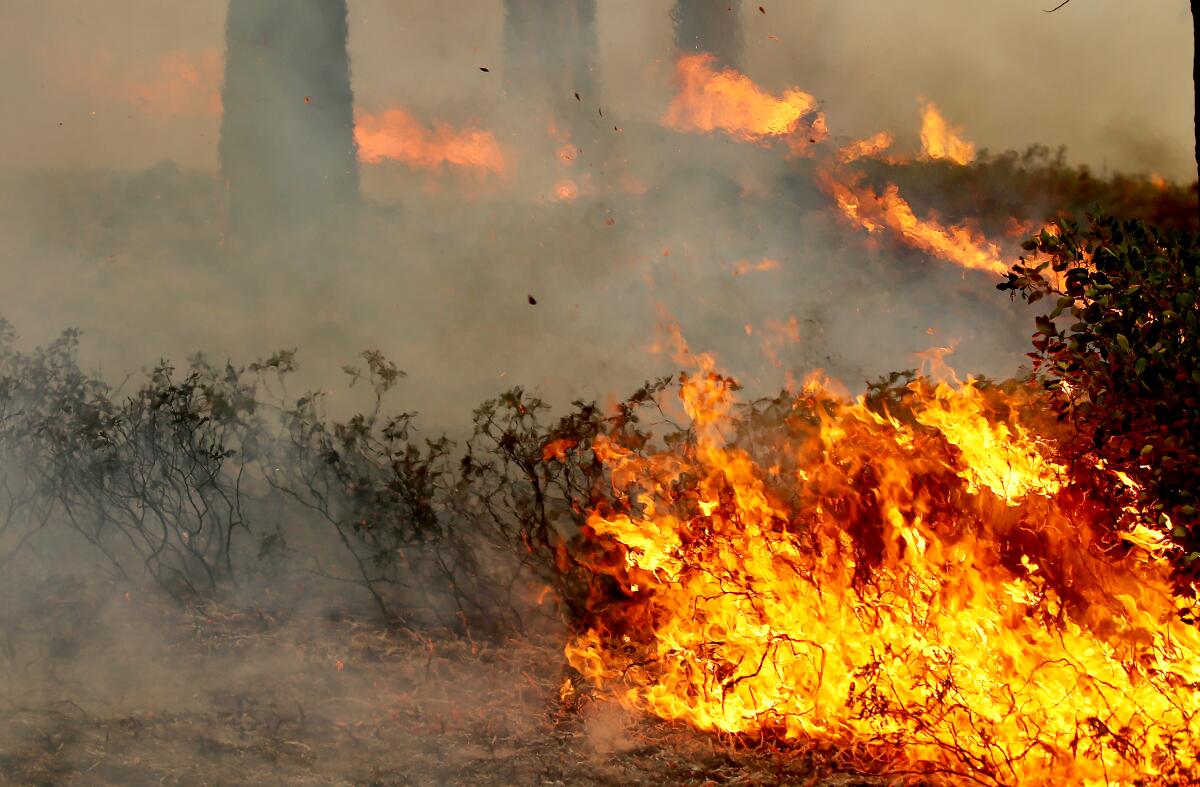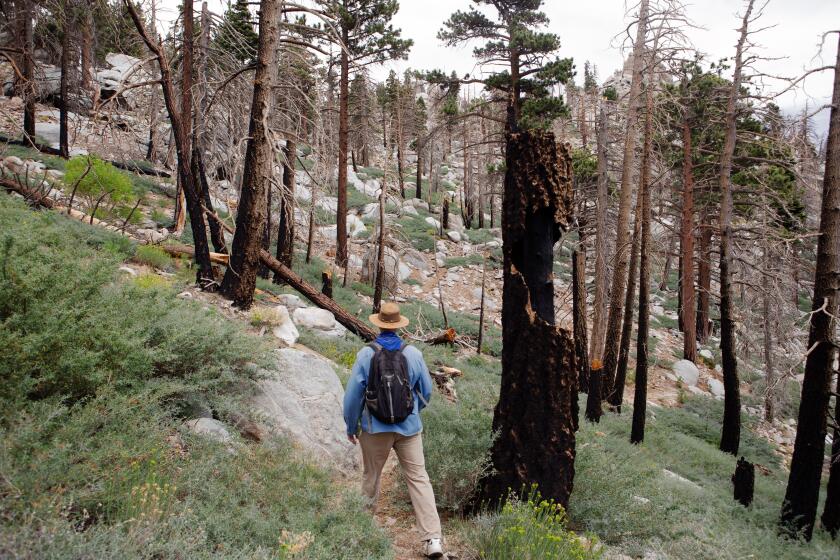Caldor fire burning east of Sacramento tops 100,000 acres, with winds expected to weaken

- Share via
PLACERVILLE, Calif. — The Caldor fire burning east of Sacramento topped 100,000 acres late Sunday, but fire officials said strong winds that have fanned the flames of the fast-moving fire are expected to weaken over the next few days.
The raging wildfire, which ignited Aug. 14, has burned 104,309 acres with 5% containment, officials said. It grew by more than 15,000 acres through Saturday and into Sunday morning, as firefighters faced gusts of winds from 30 to 40 mph.
“The fire did get some good progression overnight and throughout the day yesterday due to that increased wind activity,” said Keith Wade, a spokesman with the California Department of Forestry and Fire Protection, or Cal Fire.
Grizzly Flats was a smoldering moonscape Sunday. Scorched trees lined the road like blackened toothpicks, some of them still burning from the inside. The smoky silence was broken only by the occasional thundering crack of one falling to the ground.
Downed power lines snaked alongside the streets. The post office was gone, its wheelchair ramp leading only to a pile of rubble. All that was left of the Grizzly Flats Community Church was its foundation and the twisted metal skeletons of chairs, still arranged in rows ready for service. The door was draped over the debris like a piece of melted cheese. Two Little Free Library kiosks near the road were untouched, the books inside them still intact.
Logging and thinning trees isn’t stopping wildfires, ecologists say. Focusing on homes can help avert more tragedies like Paradise and Greenville.
The fire made a run uphill Sunday afternoon. Fire crews pumped water from a creek to try to beat back the crackling flames. Several police officers and firefighters surveyed the fire from a ridge top, the heat palpable as a large column of smoke rose from the canyon below.
A “more favorable weather pattern” was expected Sunday, Wade said, with an inversion layer that kept the smoke low and prevented oxygen from getting to the fire.
“We’re expecting much lighter winds today and really into the early part of the week,” Craig Shoemaker, a meteorologist with the National Weather Service, said Sunday morning.
There may be gusts from 12 to 15 mph for a brief period in the afternoon, but “generally no major wind event or anything through early next week,” Shoemaker said.
The fire had destroyed 351 structures as of Sunday evening. Due to the fire threat, nine national forests in the region were closed Sunday through Sept. 6.
Conditions at base camp in Placerville were noticeably smokier Sunday morning compared with the day before, which is somewhat of a good thing when it comes to fire behavior, said Capt. Thomas Shoots, public information officer for Cal Fire.
“We have a smoke inversion that sets in. It creates a bit of a stable air mass, and so the fire’s not able to really take off and build that column until that smoke clears,” he said. The inversion was expected to burn off later Sunday, possibly leading to increased fire activity.
There were about 60 miles of open line around the fire. Crews are working to contain it but must first prioritize making sure people are safe and defending the many homes in the area, he said. They’ve also been challenged by the remote location and extremely dry vegetation that is primed to burn.
“The fire is spreading through terrain that’s incredibly dangerous, incredibly steep, hard to get dozers in, so to get containment line around it means we have hand crews on the side of a hill doing the best that they can to punch line around it,” Shoots said.
“We have a lot of work ahead of us, but we’re in it for the long haul,” he said.
Authorities shut down a stretch of Highway 50 and issued new evacuation orders Friday evening in anticipation of the weather.
On Saturday evening, the El Dorado County Sheriff’s Office asked for help finding Marvin Hardy Creel, a 57-year-old who was evacuated from Grizzly Flats due to the fire. Authorities said Creel last called a family member Aug. 18, but that the call had poor reception. Repeated calls to his phone since have not been answered.
Authorities found his white Dodge pickup abandoned in the Grizzly Flats area.
Nearly 30,000 people have been evacuated. Among those who have hunkered down in evacuation shelters were Frank and Jeannette Castaneda, who have been living out of their truck in the parking lot of a community center.
Frank, 73, estimated that it was the sixth time they’d had to evacuate in the 35-plus years they’ve lived in the rural Pacific House community in the El Dorado foothills.
The Cameron Park Community Center was full Saturday, with 42 people staying inside and 27 more on the grounds. With the shelter at capacity, the Castanedas set up folding chairs under trees to spend the afternoon. Maggie, a Catahoula, was sprawled out on a dog bed between them. The animal had finally started to eat and was even sleeping a little bit, said Jeannette, 70.
Although fires used to force them from their home every 10 years or so, the couple said, the pace has picked up recently and the blazes have grown fiercer.
“The fires seem to be getting bigger and bigger every year,” Frank said.
More to Read
Sign up for Essential California
The most important California stories and recommendations in your inbox every morning.
You may occasionally receive promotional content from the Los Angeles Times.













